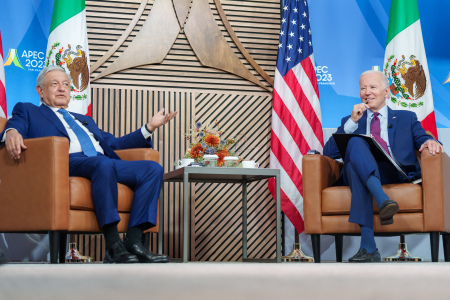Mexico president refuses to fight drug cartels on US orders: 'Our home comes first'

Mexico President Andrés Manuel López Obrador agreed to help limit the flow of drugs into the United States but won't confront drug cartels on U.S. orders, declaring that Mexico would not "act as policemen for any foreign government."
López Obrador's declaration comes amid ongoing concerns about the Biden administration's immigration policies and the flow of drugs, such as fentanyl, coming into the U.S. through the southern border.
During a news briefing last Friday, López Obrador acknowledged reports about the increasing number of fentanyl-related deaths in the United States. While he offered to help limit the flow of drugs, the president refused to go after drug cartels.
"We are not going to act as policemen for any foreign government," López Obrador said, according to The Associated Press. "Mexico First. Our home comes first."
López Obrador has argued against confronting drug cartels in favor of a "hugs, not bullets" approach, saying violence can't be fought with violence. He came to office in 2018 pledging to overhaul Mexico's militarized response to drug cartels. Amid Mexico's war against drug cartels, tens of thousands of people were killed between 2007 and 2014.
He also believes the government should focus on underlying issues that result in drug cartels, such as poverty and a lack of opportunities.
"Of course, we are going to cooperate in fighting drugs, above all because it has become a very sensitive, very sad humanitarian issue because a lot of young people are dying in the United States because of fentanyl," López Obrador said during the Friday briefing.
As the U.S. Centers for Disease Control and Prevention reported this month, nearly 108,000 Americans died of drug overdose deaths in 2022. The CDC noted that between 2021 and 2022, the rate of overdose deaths for synthetic opioids other than methadone increased 4.1%.
"The age-adjusted rate of drug overdose deaths involving synthetic opioids other than methadone, which includes fentanyl, fentanyl analogs, and tramadol, was mostly stable from 2002 (0.4 deaths per 100,000 standard population) to 2013 (1.0) and then increased through 2022 (22.7), with different rates of change over time," the CDC reported.
Earlier this month, U.S. Customs and Border Protection Officers at the San Ysidro Port of Entry discovered a total of 100 packages in the dashboard and front seats of a vehicle after the driver came to the port to apply for admission to the U.S.
CBP officers seized an estimated 561,000 fentanyl pills, according to the March 1 press release. The approximate street value of the pills was $11.2 million. The officers turned the vehicle driver over to the Department Homeland Security and seized the drugs.
In June 2022, Pastor Lorenzo Ortiz, who operated four shelters in northern Mexico to assist migrants, recounted how he and dozens of migrants were kidnapped by a Mexican drug cartel.
During a 45-minute interview for Fellowship Southwest, Ortiz said that his captors demanded to know how much he charges migrants for staying at one of his shelters. The pastor's captors refused to believe him when he said that he did not charge migrants anything.
Due to Ortiz's humanitarian work, the Mexican National Guard and other authorities worked for the pastor's release. While his captors initially held him for a ransom of $40,000, Ortiz said his kidnappers eventually dropped the demand. Ortiz credited the miracle of his release to the power of prayer.
"The cartel was shaken ... the cartel never felt so vulnerable," Ortiz said.
Elket Rodriguez, Cooperative Baptist Fellowship field representative to migrants and communities along the U.S.-Mexico border, told CP at the time that drug cartels typically don't target Christians in the field.
"The cartels overwhelmingly kidnap migrants and asylum seekers," he said. "Pastors, missionaries, and other church workers are kidnapped when cartels believe that they represent a threat to their trafficking enterprise."
Samantha Kamman is a reporter for The Christian Post. She can be reached at: samantha.kamman@christianpost.com. Follow her on Twitter: @Samantha_Kamman




















